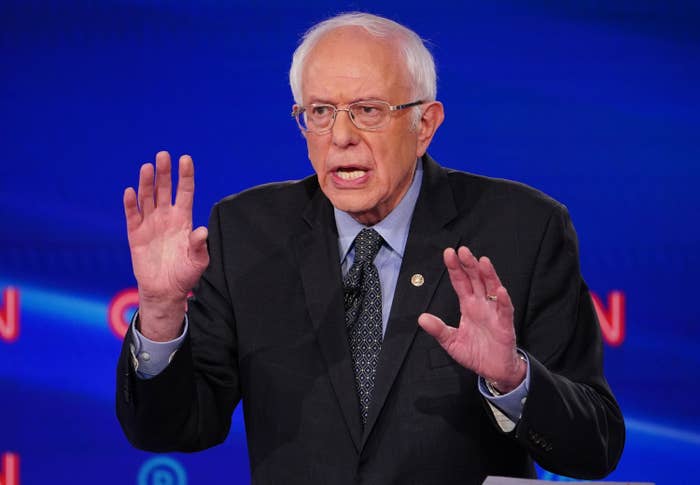
Bernie Sanders called for all US households to get $2,000 a month and for gig economy workers to receive unemployment money for the duration of the coronavirus emergency.
Sanders made the proposals during a speech outlining a package of measures aimed at increasing the capacity of the US medical system and helping Americans weather a looming financial crisis as a result of the novel coronavirus pandemic.
Sanders estimated that the set of proposals, which he said he would present to Democratic leadership, would cost around $2 trillion.
“In this unprecedented moment, this will require an unprecedented amount of money. My own guess is that we’ll be spending two trillion dollars in funding to prevent deaths, job losses, and to avoid an economic catastrophe,” Sanders said.
The Trump administration on Tuesday said it was considering sending most American adults a check for $1,000 as part of efforts to stimulate the economy and help workers whose jobs have been disrupted by business closures because of the pandemic.
Sanders' proposals repackaged many of the ideas that he has campaigned on in the Democratic primary, like "Medicare For All" and canceling student debt. He also included a number new proposals to guarantee access to medical treatment for Covid-19, the disease caused by the new coronavirus, and to provide economic relief for workers and small businesses. He also said he wants ensure people have access to housing as the crisis wears on.
To address the possible shortage of medical facilities, Sanders proposed calling on the National Guard and the Army Corp of Engineers to expand hospital facilities and build mobile testing centers. He also called for invoking the Defense Production Act, passed in 1950 during the Korean War, in order to guarantee production of necessary supplies like face masks.
The bulk of the speech was focused on economic measures, both to cover medical costs and to stave off a possible recession. Sanders proposed temporarily empowering Medicare to cover all medical bills during the emergency. He drew a distinction between this proposal and the "Medicare For All" policy that he has campaigned on, which he said could not be passed in short order, but said that coverage should extend to all medical needs, not just those related to the coronavirus.
“So that everybody regardless of their healthcare needs, and I’m not just talking about the coronavirus, will get all the healthcare that they need," he said. "That is what we should be doing in this moment of crisis.”
In addition to direct cash disbursements to all households, Sanders said unemployment assistance should cover 100% of the amount of prior salaries up to $75,000 for anyone who is laid off or loses their income due to the crisis, and that the current program should be expanded to include tipped workers, domestic workers, independent contractors and freelancers.
“Doesn’t matter what work you’re doing. If you lose your job, you need unemployment,” he said.
Sanders made little mention of his campaign for the Democratic nomination for president, even as the results for Florida came in on another big primary election that led to another victory for rival Joe Biden.
Sanders said his proposals were intended as a series of options for Congress, acknowledging that leadership would ultimately pick and choose from what was on the table. And he called for supporters to write into the campaign to describe their experiences to ensure that his proposals addressed all needs related to the crisis.
Sanders said the most important thing was for Congress to act quickly.
“Importantly, we must make certain that the government is getting this money into the hands of working families and the most vulnerable as quickly as possible,” he said.
You can watch the full speech here:

